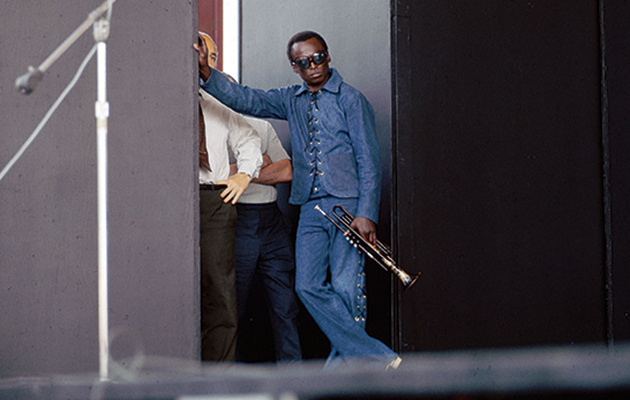ON THE CORNER
Columbia, 1972
Produced by Teo Macero
Stockhausen, funk and civil rights are in the mix for this funky loop-based LP. The sessions also birth Get Up With It, and its half-hour long tribute to Duke Ellington, “He Loved Him Madly”, an Eno favourite.
MICHAEL HENDERSON (BASS): Miles was like a soothsayer. He could feel and interpret stuff. You know how you can’t lie to your mother, ’cos they know you? Miles looked through you, so you better come with the truth. If you were intimidated it’d make you quit – or it’d make you jump in and swim as fast as you could. He wanted to get funkier, and bring in the Eastern vibe. I met Paul Buckmaster [cello/arranger] at Miles’ house. You’re pretty quiet at Miles’ house, ’cos he doesn’t speak above a whisper. Paul seemed like a nice guy, he had some charts and things for us. A brilliant guy. Miles recognised that and they hit it off. And when we got to the studio we threw the ideas out. It was a fun session – I felt we were doing something great. You walk in, there’s a sitar player, two guitar players, a Conga player, a tabla player… The On The Corner band – those guys are still in the music, ’cos people sample them all the time. On The Corner is almost the first hip hop record, in the sense that they did a lot of looping. That was Teo Macero’s technique.
_________________
THE MAN WITH THE HORN
Columbia, 1981
Produced by Teo Macero
Debilitated after two car accidents, in 1975 Miles retires for the rest of the decade. When he re-emerges, continuity remains in the shape of Al Foster (drums) and Miles’ commitment to finding new jazz talent.
BILL EVANS (SAX): In February 1980, I was living in a loft on 27th St. One of my roommates said, “I think it’s Miles Davis on the phone.” He asked me to come up to his building on the Upper West Side and to bring my soprano [sax]. A woman met me at the door: “He’s been expecting you. He’s upstairs, follow me.” He was relaxing on a bed. We then proceeded to where Bobby Irving, who was in the first sessions, was playing a small keyboard. Miles says, “Hey Bobby, play a blues in G.” He stood next to me and said: “Play!”
MARCUS MILLER (BASS): Miles isn’t going to give you a lot of direction. He took me to the piano and showed me two notes, and said, “You got it?” I said, “Yeah, I got it.” So the band showed up and I played the two notes over and over. Miles said, “What the fuck you doing, man? You just gonna play those two notes?” Next take I played like a million, and he said, “What the hell you doing? Just play two notes!” Third time, I went a bit deeper. The last take, he said, “You all played like a bunch of faggots, man,” and left the studio. But he gave me a wink as he walked by.



